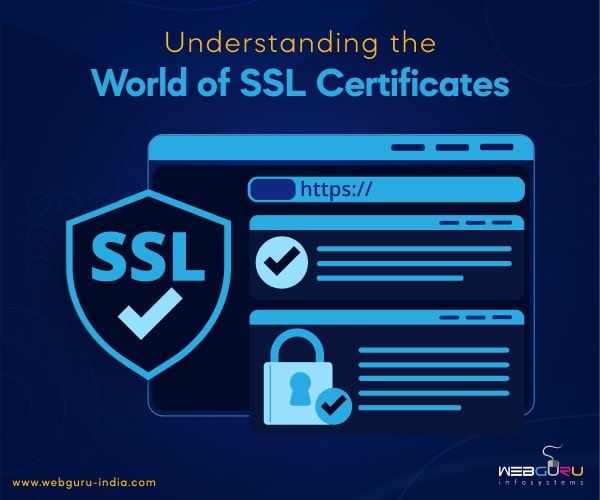Home Blog Website Development Understanding the World of SSL Certificates
Understanding the World of SSL Certificates
- 26 Jun / 2023
- 2,012 views
- 6 Min Read

Maintaining the security of your online presence is crucial if you are a website owner or administrator. In the first 3 quarters of 2020 alone, businesses worldwide experienced 2953 data breaches, highlighting the severity of the issue. Shockingly, small businesses bear the brunt of approximately 43% of cyber attacks, while only 14% are adequately prepared.
To ensure the security of your website, the role of an SSL certificate is very important. Your chosen website design company can help you acquire one. The blog examines SSL certificates in great detail, including their functions and benefits.
Understanding SSL Certificates
Secure Sockets Layer certificates, or SSL certificates in short, are tiny data files that digitally link a cryptographic key to information about an organization. When installed on a web server, SSL provides a secure connection between the server and a browser. All information that is sent between the two can be kept private and safe with the help of this secure connection. To put it simply, SSL certificates make it much harder for hackers to intercept or tamper with your information.
SSL has now been integrated into a broader security protocol called Transport Layer Security (TLS), but the term “SSL” is still commonly used to refer to these certificates. An SSL certificate contains the following information:
1. The domain name for which the certificate was issued.
2. The legal owner of the certificate.
3. The physical location of the owner.
4. The validity dates of the certificate.
5. The details of the Certificate Authority responsible for issuing the certificate.
Benefits of SSL Certificates for Your Website
SSL-secure websites have their URLs starting with HTTPS. About 95% of the websites that you’ll see in Google use HTTPS. Let’s explore the fantastic benefits SSL certificates bring to the table.
1. Enhanced Data Protection and Privacy
You’ll feel secure knowing that any data shared between your website’s visitors and you stays protected thanks to an SSL certificate. Whether it’s personal information, login passwords, or credit card information, SSL makes sure it’s safe and private. SSL certificates offer a strong defense against data breaches and disrupt the schemes of fraudsters by encrypting this data.
2. Establishing Trust and Credibility
Imagine landing on a website and seeing a reassuring padlock symbol or the magic letters “HTTPS” in the address bar. Instantly, you feel a sense of trust and confidence in the website security. SSL certificates offer these trust indicators, demonstrating to your visitors that you value their security and privacy. This can significantly boost their confidence in your brand, leading to increased engagement, longer browsing sessions, and ultimately, more conversions.
3. Boosting Search Engine Rankings and SEO
Did you know that search engines like Google consider HTTPS as a ranking factor? By implementing an SSL certificate, you not only enhance your website’s security but also improve its visibility in search engine results. This increased visibility, paired with the positive user experience HTTPS provides, can give your website an edge over competitors and drive more organic traffic your way.
4. Compliance with Data Protection Regulations
Many laws have been implemented to safeguard consumers as data privacy is becoming a more widely recognized issue. In order to comply with these rules, SSL certificates are essential. Some well-known examples are the California Consumer Privacy Act (CCPA) in the United States and the General Data Protection Regulation (GDPR) in Europe. If you do not follow these regulations, you may have to end up paying hefty fines, alongside the reputational damage that will cost.
Types of SSL Certificates
Various SSL certificates cater to different website requirements. Consider the following options:
1. Domain Validated (DV) Certificates: Suitable for basic encryption needs, these certificates are affordable and easily obtainable, providing a quick solution for securing your website.
2. Organization Validated (OV) Certificates: If you wish to establish your organization’s identity and enhance credibility, OV certificates are ideal. They undergo a rigorous validation process, instilling additional trust in your visitors.
3. Extended Validation (EV) Certificates: For the highest level of authentication and trust, opt for EV certificates. Websites with EV certificates display the organization’s name in the browser’s address bar, further reinforcing user confidence.
4. Wildcard SSL Certificates: Do you have multiple subdomains that need securing? Wildcard SSL certificates allow you to secure all of them with a single certificate, simplifying your management tasks and reducing costs.
5. Multi-Domain SSL Certificates (MDC): If you have multiple websites or domains, MDCs are an efficient and cost-effective solution. You can secure all your domains with just one certificate, saving you time and money.
6. Unified Communications Certificates (UCC): Designed specifically for Microsoft Exchange Server and Office Communications Server, UCCs enable secure communication for multiple domains and services.
Factors to Consider When Choosing an SSL Certificate
Selecting the right SSL certificate is very important. Consider the following factors before making your decision:
1. Certificate Authority (CA) reputation and compatibility.
2. Level of encryption and key length.
3. Warranty and insurance coverage.
4. Support for subdomains and wildcard certificates.
5. Validation process and issuance time.
SSL Certificate Installation and Management
Installing and managing SSL certificates doesn’t have to be a headache. Here’s a simplified process:
1. Create a Certificate Signing Request (CSR).
2. Choose a suitable web server for installation.
3. Install the SSL certificate and configure HTTPS.
4. Regularly renew and manage certificate expiration.
5. Keep an eye on SSL/TLS vulnerabilities and promptly address any issues.
Common SSL Certificate Errors
While SSL certificates are generally reliable, issues can arise. Here are some common errors:
1. Certificate mismatch and domain name errors.
2. Mixed content warnings and insecure elements.
3. Dealing with expired or revoked certificates.
4. Improper redirects from HTTP to HTTPS.
Additional Considerations for eCommerce Websites
If you run an eCommerce website, paying attention to security is paramount. Consider the following aspects:
1. Payment Card Industry Data Security Standard (PCI DSS) compliance.
2. SSL certificate recommendations for online transactions.
3. Securing customer data and building trust in eCommerce.
Conclusion
The importance of SSL certificates in protecting your website should now be clear to you. Remember that SSL certificates not only encrypt sensitive data but also build confidence and trust, improve website rankings, and help you obey data protection laws. Therefore, spend money on the appropriate SSL certificate for your website and benefit from the confidence that comes with having a safe online presence.

Shrutarshi Das
Shrutarshi Das is a purveyor of all things digital, with a particular interest in new technological innovations, photography, and gaming.
2 comments
Leave a Reply

-
1000+
Happy
Clients -
25+
Countries
Served -
19+
Years of
Trust








Great breakdown of SSL certificates! I appreciate the clarity on the different types and factors to consider. Can you delve into how SSL certificates play a role in mobile app security as well? Looking forward to more informative posts like this!
Great, thanks for sharing this article.Much thanks again. Really Cool.